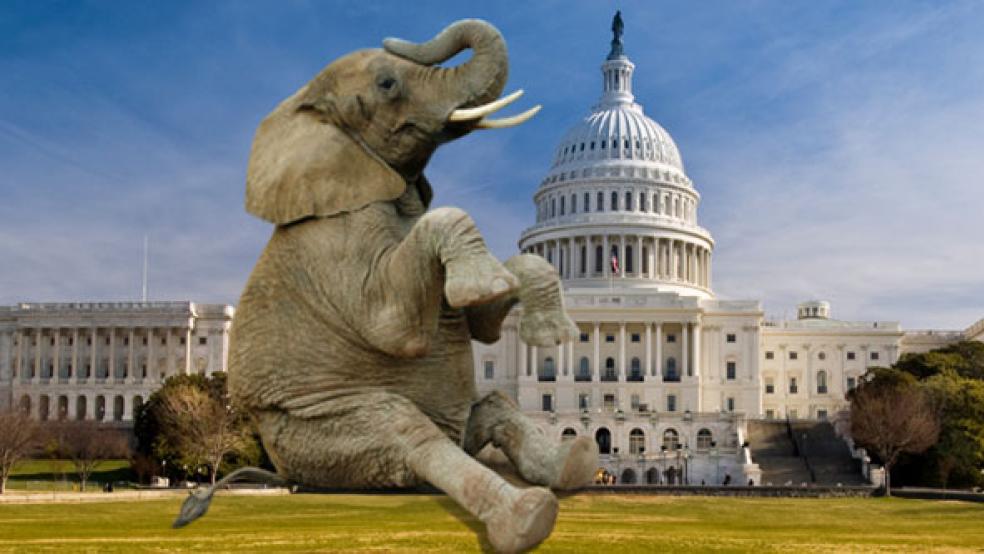The upcoming presidential election gives voters a choice between two very different philosophies of government. For Democrats, an activist government is necessary to keep markets functioning, and to smooth economic fluctuations. Without government oversight, markets would be captured by monopoly power, consumers would be at the mercy of unscrupulous producers, there would be distortions from adverse selection, information asymmetries, moral hazard problems, and so on. In addition, if government does not take action when a recession hits, the downturn will be much worse and much longer than necessary.

For Republicans, however, activism is exactly the wrong approach to take. They believe that the key to making markets work and smoothing economic fluctuations is for the government to get out of the way and let the private sector work its magic. In general, markets react faster, incorporate more information, and regulate commercial behavior better than humans will ever be able to do.
What is behind the stark difference in views about the role of government? Activists believe that market failures have large negative consequences, that these problems won't necessarily fix themselves, and that government is an effective way of overcoming these problems. Government isn't perfect, but neither is the private sector (see the bulldozed waste from the housing bubble), and on net it’s helpful for the government to take action when relatively severe market failures are present. Traditionally, those who take a more hands off approach do not deny that all markets fail to some degree – no market is perfectly competitive. But for the most part they do not see these failures as having large consequences, and even when they do, government intervention is rarely the solution. In many, if not most cases, that just makes things worse.
In the modern Republican Party, these views have been taken to the extreme so that government is rarely, if ever, supported. But there are some areas where private sector will not provide goods and services by itself, public goods for example, and even when the goods are provided market failures distort the outcome.
Who will build bridges, provide sewage systems, national defense, roads, airports, water systems, and so on if not the government? Who will force internalization of all costs of production if not the government? Who else can overcome adverse selection, information, and moral hazard problems in health and retirement markets? Conservatives can come up with stories about how the private sector will overcome these problems and provide goods in each case, but historically these goods simply haven't been provided, at least not at the scale and breadth needed. That's why government stepped in to begin with. To think it will somehow be different this time if government stepped out of the way is highly wishful thinking.
We cannot function economically without supporting infrastructure, we are already falling behind where ought to be and that will prove costly over time, and we cannot allow externalities, particularly those associated with global warming, to run rampant. Conservatives used to understand that government had an important role to play in these areas, and opposition to government was based upon coherent reasoning rather than a knee-jerk rejection of government.
This extremism within the Republican Party is hurting the economy. In the short-run, it makes it much harder to do anything about the recession. Even if you believe spending more on infrastructure will do nothing to help employment, letting infrastructure crumble will hurt our long-run growth, and presently the construction of infrastructure is about as cheap as it gets. Infrastructure is inherently a supply-side policy with attractive demand side effects in a recession, and the refusal of Republicans to support such spending looks far more like a political ploy than a well-reasoned position.
But that may pale in comparison to the long run consequences of failing to deal with global warming. Here we have a party that purports to be all about letting markets work their magic confronted with a clear market failure with considerable potential consequences, a problem that the private sector will not fix by itself. So what do they do? They know that there's no solution except government intervention if they admit to a consequential market failure, so they deny that a problem even exists.
There was a time when extremists were not the main voice of the Republican Party, a time when we had some chance of dealing with important issues. There were arguments about the precise location of the line separating when the government should and shouldn't step in, and there were debates about command and control versus market based mechanisms to solve problems. But both sides understood that the lines existed, and when both lines were crossed there was at least a chance the two sides would come together to solve our problems.
Unfortunately, those days are long gone, and if Republicans win big in November it will be a long time before we see them again.






